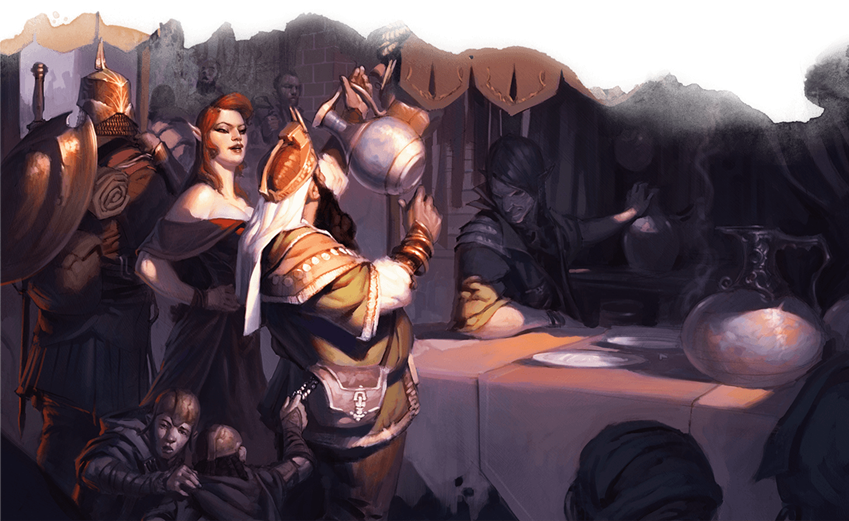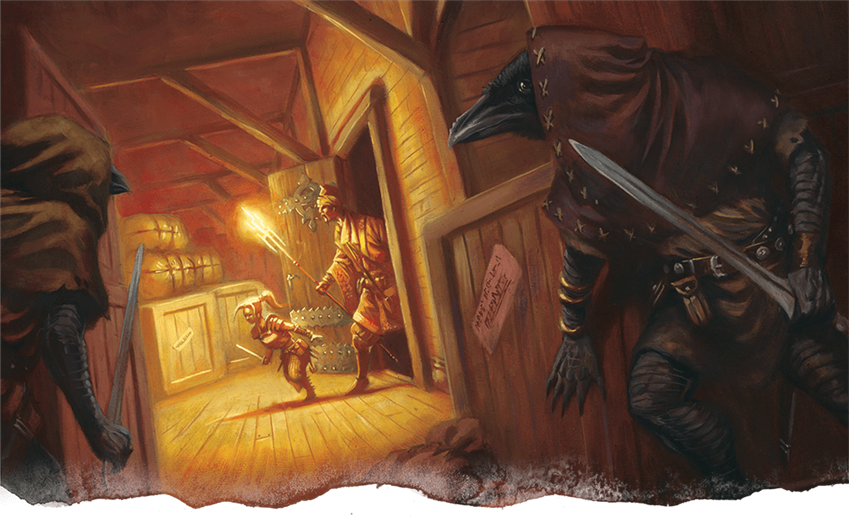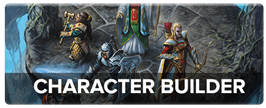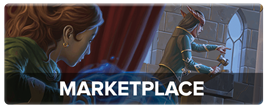House rules can make your D&D games more epic. If your game features lots of ability checks, and your characters use their skill and tool proficiencies all over the place, this new Talented Checks house rule can speed up your game, make your characters feel more like competent heroes, and make it easier to run mystery and social intrigue adventures. Let’s talk about Talented Checks!

Talented Checks
This house rule is short and sweet. Let’s start by stating it plainly here, and then we’ll dive into the nuances, interactions, and side effects this rule has as it echoes throughout the rest of the D&D rules. Here’s the house rule in its entirety:
If you’re proficient with a skill or tool, you automatically succeed on ability checks using that proficiency if the DC of that check is equal to or lower than 10 + your modifiers that apply to that check.
This is a fairly simple house rule, but it can have a massive impact on how your D&D game runs. It’s well-suited to social intrigue or mystery stories (like Waterdeep: Dragon Heist or adventures like The Styes in Ghosts of Saltmarsh), or any other adventure in which characters are expected to make a lot of checks.
This house rule even has uses in dungeon-crawling tales like Waterdeep: Dungeon of the Mad Mage, since it makes each class’s identity in the dungeon even more distinct. If a fighter has proficiency in Athletics, giving them the ability to automatically succeed on easy Strength (Athletics) checks lets their player feel like a competent action hero—which is the core of their class. Likewise, rogues can confidently pick locks that aren’t too beyond their skill, and wizards can comfortably succeed at Intelligence (Arcana) checks to decipher magical secrets, making them feel like all that studying they did in Candlekeep was worth something in the long run.

Passive Checks vs. Talented Checks
Most D&D players are at least passingly familiar with passive checks—particularly the most common type of passive check, a passive Wisdom (Perception) check. Your passive Wisdom (Perception) score is listed on your character sheet, and that value is equal to 10 + all modifiers that normally apply to the check, such as your Wisdom modifier and your proficiency bonus (if you’re proficient in the Perception skill).
Talented checks use the same formula as passive checks for determining success and failure, but they work differently. Here are some distinctions to keep in mind if you’re using this house rule.
Passive checks are always on; talented checks aren’t. When you enter a room in a dungeon, you automatically succeed at any Wisdom (Perception) checks that have a DC equal to or lower than your passive Wisdom (Perception) score. Even though a talented check can automatically succeed, you still need to actively choose to make an ability check.
You need to be proficient to make a talented check. Anyone can make a passive check. For instance, you still have a passive Wisdom (Perception) score even if you aren’t proficient in the Perception skill. Your passive score in that case is equal to 10 + your Wisdom modifier. Talented checks, however, can only be made by people who are proficient with the skill or tool being used. This helps protect the usefulness of characters that have invested resources into mastering a certain type of skill or tool.
Not all checks are passive checks, but any check can be talented. The rules of D&D aren’t clear on what checks can or can’t be passive. By the rules, any combination of ability scores and proficiencies can be made “passive,” but the only ones that are called out specifically by the rules are passive Wisdom (Perception) and passive Intelligence (Investigation)—the latter only shows up in the [feat]Observant[/feat] in the Player’s Handbook. That’s why those two passive scores are the only ones that appear on the D&D Beyond Character Sheet. If you want to make any other skill passive, you need to talk with your players (or ask your DM) and make it clear that’s what’s happening.
That’s not the case with talented checks. If you use this house rule, you’re making a clear statement to your players that if you’re proficient with a skill or tool, you can simply choose to succeed on easy checks using those proficiencies.

What about Reliable Talent?
Reliable Talent is a rogue class feature that allows you to “treat a d20 roll of 9 or lower as a 10” whenever you “make an ability check that lets you add your proficiency bonus.” This house rule is essentially expanding Reliable Talent to all characters, but with less dice rolling. This is only a problem if your game reaches 11th level and you have a rogue in your party; they’ll need to receive another mechanical bonus to replace the one that this house rule has essentially given to everyone.
A fine replacement for Reliable Talent is the bard’s Jack of All Trades class feature, which allows you to add half your proficiency bonus to any check that you wouldn’t otherwise add your proficiency bonus to. Even though its function is different, replacing Reliable Talent with Jack of All Trades as the rogue’s 11th-level class feature fulfils a similar role of improving their odds of success when making ability checks.
What about Temporary Proficiency?
Some class features, like the Knowledge Domain cleric’s Channel Divinity: Knowledge of the Ages feature, temporarily grants you proficiency with a skill or tool. Given a strict reading of the rules, this house rule allows you to make a talented check as long as you are proficient with a skill or tool; there’s no stipulation that you must always be proficient, just that you must be proficient when you make the check. This house rule certainly makes Knowledge Domain clerics better, but I don’t think it makes them particularly overpowered.
As with any house rule, it’s incumbent upon you and your table to work with your players and Dungeon Master to modify the rules to suit your needs.

What about Xanathar’s Guide to Everything?
Xanathar’s Guide to Everything gives Dungeon Masters and players a great deal of specific guidance on how to use tool proficiencies in fun and useful ways. Some of the fun of using these tool proficiencies relies on the tension of the dice; will you succeed at forging a signature with your calligrapher’s tools, even with its high DC? This house rule doesn’t make it more likely for characters to succeed at incredibly hard checks, but it does make it a guarantee that they’ll succeed at the easier checks, since they have to be proficient with a particular tool in order to attempt some of these specialized checks in the first place. I don’t think that this causes any problems, unless you really enjoy the uncertainty involved in possibly failing easy checks.
Xanathar’s also gives guidance on making downtime activities exciting. Some of these downtime activities involve making ability checks to determine how well you succeed at a certain activity. For instance, committing crimes while in town requires you to choose a DC, and then make several checks against that DC. If your characters just want a little bit of easy cash, it could become boring if they choose a DC that they can automatically beat using a talented check. Removing the risk of failure could make checks like this rote and mundane.
On the other hand, it’s up to you to decide if this is a bad thing or not. Your party may have a little more gold than usual, but what’s wrong with that? If one of your character is a master thief who just wants a reliable cash flow, let them live out the fantasy of pulling off a string of flawless low-profile capers week after week. But you’ve seen enough heist movies to know they’ll eventually want more, right? Thieves in movies, plays, and TV shows have massive egos and poor impulse control; they’re always looking for something bigger, badder, and shinier.
If this house rule causes crime (or whatever your players’ go-to downtime activity is) to become routine, try upping the ante yourself. Drop hints about the “Grand Diamond of Cormyr” being put on display in the Waterdeep Metropolitan Museum for a tenday only in one month’s time. This isn’t just a standard crime; this is a crime with DCs of 30 across the board. The characters are going to need to do a lot of legwork to rig these checks in their favor, and talented checks won’t help them here.
Do you have any questions about this house rule? How would you use it in your D&D games? And do you have any house rules of your own? Let us know in the comments!
Special thanks to @ThinkingDM for his thread about passive skills, which inspired me to revise and expand my original draft of this house rule.
Create A Brand-New Adventurer Acquire New Powers and Adventures Browse All Your D&D Content
 James Haeck is the lead writer for D&D Beyond, the co-author of Waterdeep: Dragon Heist, Baldur's Gate: Descent into Avernus, and the Critical Role Explorer's Guide to Wildemount, a member of the Guild Adepts, and a freelance writer for Wizards of the Coast, the D&D Adventurers League, and other RPG companies. He lives in Seattle, Washington with his fiancée Hannah and their animal companions Mei and Marzipan. You can find him wasting time on Twitter at @jamesjhaeck.
James Haeck is the lead writer for D&D Beyond, the co-author of Waterdeep: Dragon Heist, Baldur's Gate: Descent into Avernus, and the Critical Role Explorer's Guide to Wildemount, a member of the Guild Adepts, and a freelance writer for Wizards of the Coast, the D&D Adventurers League, and other RPG companies. He lives in Seattle, Washington with his fiancée Hannah and their animal companions Mei and Marzipan. You can find him wasting time on Twitter at @jamesjhaeck.











-
View User Profile
-
Send Message
Posted Aug 27, 2020How would these house-rules work with the Eloquence Bard's Silver Tongue? "When you make a Charisma (Persuasion) or Charisma (Deception) check, you can treat a d20 roll of 9 or lower as a 10." It's a reliable talent for persuasion and deception checks, but bards already get Jack of All Trades
-
View User Profile
-
Send Message
Posted Aug 27, 2020I think it's self-explanatory: one deals with rolls made for Persuasion or Deception checks; the other deals with bypassing rolls for skills you are proficient with if the DC is below your average result. So if you're proficient in Persuasion or Deception and you are asked to make a check with DC 10 + your bonus, you could treat it as a success; otherwise you use the rule that applies.
-
View User Profile
-
Send Message
Posted Aug 27, 2020Ok but like, not every table has fun sitting around rolling dice. I play with some folks who do (and even I will never pass up the rush that is a max level crit divine smite on an undead creature) and those folks are power gamers and are totally fine. But I LOVE this house rule, especially for folks who prefer role play. Auto grapple doesn't apply here since grapple is always contested, which means the person being grappled sets the DC (and thus could be surprisingly slippery or strong). But even if auto grapple was a thing, if you're playing an 8'4" orc with 29 strength and you're trying to grapple some fat, lazy, autocrat he's not gonna be escaping either way. So I think it still works no matter how you rule it, as long as your table is looking for role play and not a dice roller.
-
View User Profile
-
Send Message
Posted Aug 27, 2020It's not quite the same thing as taking 10, as IIRC taking 10 assumed you also took 10 minutes to do the thing. This was impossible in time crunched/dangerous situations and IMO is a better method than Talented checks because of it. You could never take 10 to grapple someone, for instance.
-
View User Profile
-
Send Message
Posted Aug 27, 2020A nice happy medium: talented checks are proficiency+stat+5, instead of +10.
-
View User Profile
-
Send Message
Posted Aug 27, 2020Take 10 didn't take 10 minutes, that was Take 20, but the rest is true, you couldn't do it under time pressure or threat. So in that regards, the talented check is kind of an improved take 10, cause you can only use it if you would succeed, while take 10 did not guarantee a pass, especially if you didn't know the DC. Take 20 was the "you take 10 times longer", but you could only do that if you had unlimited "retries" - that is, no time pressure or threat, and failure does not have consequences.
-
View User Profile
-
Send Message
Posted Aug 27, 2020...that would make it mostly useless though, partially because 75% of the time you would not roll lower than that anyway, and partially because adding 10 to your bonus is way faster for anyone than adding 5, which greatly defeats the purpose of this trying to speed up trivial tasks.
-
View User Profile
-
Send Message
Posted Aug 27, 2020I think most of the complaints would be valid except they are missing some important qualifiers, that this is intended to smooth over the game where it is not fun, not remove fun from the game.
For example, Long Jump rules say 'Move 10+ feet, and jump a number of feet up to your Strength score. When you make a standing long jump, you can only leap half that distance."
If I were unfamiliar with this rule, I would have made every single player roll an Athletics check at a fixed DC based on the distance required.
This is kind of unreasonable in many circumstances. Instead, I would prefer that the most athletic characters succeed the jump, and then the players come up with a way for the weakest character to safely get across, rather than having everyone risk falling into a pit of death due to random chance
-
View User Profile
-
Send Message
Posted Aug 27, 2020What about Passive Wisdom (Insight)?
-
View User Profile
-
Send Message
Posted Aug 27, 2020What about it?
-
View User Profile
-
Send Message
Posted Aug 27, 2020I'm not a fan of this personally; with the way that skill checks work, as your bonus gets higher, you become effectively immune to more levels of difficulty already.
For example, I have a sixth level Bard with +11 in Deception, Persuasion, meaning I can't get lower than a 12 on a check, so anything with a DC 10 is automatic. As his proficiency improves he's only going to get better and better, maxing out around +17 (+5 CHA, +12 for expertise) meaning immunity to any DC or Insight of 17 or less.
I could see this kind of idea more for streamlining in certain situations, but really we already have passive skills (perception, investigation, insight) for cases where that's most appropriate anyway.
For me, I'm more inclined to go the opposite route and house-rule back in critical failures on skill checks, as even the most eloquent Bard in the world can still say the wrong thing by accident, just as the most athletic barbarian can put a foot or hand wrong while climbing; things that require your skills do-so because they're challenging, so there should always be the possibility of failure. I'm also a bit concerned about how it might interact with stuff like History; a player who has a high History score could end up knowing pretty much anything they ever need to know automatically, which I don't think makes sense.
Obviously people can play however they want, so if you like the sound of the rule, try it, but I don't think it's for me.
-
View User Profile
-
Send Message
Posted Aug 27, 2020I'm really not a fan of that cause that can lead to level 1 characters being able to persuade the king to give them their kingdom ("But I've rolled a nat 20!!!") or level 19 people falling on their face when trying to jump over a knee high fence with a nat 1. ("Hey, it's jumping, you should roll!")
Meanwhile, it does make sense that a character who chose to be proficient in History, and even chose Expertise in it would be more reliably know about things than a 5 year old kid who happened to roll a natural 20...
-
View User Profile
-
Send Message
Posted Aug 27, 2020Please note that I did not mention critical successes, only critical failures 😉
-
View User Profile
-
Send Message
Posted Aug 27, 2020Please not that still does not exclude the rouge with expertise in acrobatics rolling a nat 1 being grappled by a 10 year old; a bard with expertise in history outsmarted by a preschooler and a level 20 barbarian not being able to jump over a knee high fence.
-
View User Profile
-
Send Message
Posted Aug 27, 2020What if you are like me and have a Half-Elf, Rogue (Scout) 11, and a Bard (Lore) 5, with Prodigy and Skilled feats. Then we have a problem since i have already got proficiency in everything, jack of all trades and Reliable tallent. What then?
I dont like giving a level 2 ability as an level 11 ability replacement. The problem is whst if you already got JoAT already, what then?
Maybe at level 11 the rgoue treats any check that adds your proficiency bonus thats 14 or less as a 15. Or go one step higher and do 19 or less as 20.
-
View User Profile
-
Send Message
Posted Aug 27, 2020And?
Just because you're good at something doesn't mean you can't make mistakes (or that the 10 year old didn't get the drop on you). Just because you're knowledgeable doesn't mean you know everything. You're also using some very purposefully obtuse examples; it's up to your DM whether to make you take a test or not, if you have a DM that would make you test for these things then you should absolutely have a chance of failing, otherwise there's no point in there being a test at all.
This is why I find this house rule article a bit strange; if you want a skilled rogue to just pick a lock, then that's up to you as DM to just allow that for the sake the time, if anything checking stats and comparing to a DC could be just as slow as rolling in such a case. It only really makes sense for group checks, e.g- if you all need to make a climb, then the characters with athletics don't roll, but everyone else still has to so you still haven't saved any time really, and eliminating any chance of failure is IMO a bit boring.
-
View User Profile
-
Send Message
Posted Aug 27, 2020...then you are a level 16 character who are on tier with superheroes, who have focused their effort on being that good with skills. If you've multiclassed in bard and spent two of your feats just to gain so many proficiencies, wouldn't you like it to be reflected in some way, instead of still having to roll to check whether you can manage at trivial tasks?
I understand that someone who've spent years learning particle physics are probably not very knowledgable in, for example, tending to horses. But the nat 1 on skill checks means they have a chance of failing to remember Newton's first law. Or a person who studied zoology fails to discern a cat from a dog.
And the above rule does not eliminate any chance of failure or that you know everything; it just gives a way to allow proficient characters to succeed in trivial tasks and knowledge (or at least at tasks that at their expertise level would be trivial).
-
View User Profile
-
Send Message
Posted Aug 27, 2020No it doesn't, because your DM shouldn't be asking you to test for such things; history checks are for things that your character might know, not for things they definitely know. If your DM is making you test for absolutely everything then you've got bigger problems than whether natural 1's are always failures.
I'm a software developer; I've studied for fifteen years to be one, and worked as one for another ten, that doesn't mean I never make a typo, use the wrong compiler settings, delete/move/rename a file by accident etc. Likewise, I love toast, I make it all the time, I would consider making it "trivial"; that doesn't mean I never overcook it.
But in D&D we're not talking about truly trivial activities, as these shouldn't be things that your DM is having you test for in the first place. If they're asking you to test for something then it's because there are potential consequences for failing; you might have climbed a rock-face a hundred times, but that doesn't mean that this time won't be the one time you fall.
Likewise, If the DM wants to have the rogue automatically unlock a door then they can simply do that by not asking for a check, there is no need for a house-rule to provide another mechanism for doing it, and natural ones being failures doesn't prevent this from being done. If your DM doesn't let you unlock the door automatically, then they want you to test for it, that's the whole point of having checks; even a supremely skilled Rogue can break a lock-pick and end up jamming the lock, or find that an old lock is rusted beyond their ability to pick it etc.
I really don't see why you're being so insistent and frankly dishonest in the way you're arguing this; you're going out of your way to invent absurd examples in order to rubbish a simple idea that sees plenty of active use (it's the same rule they use on Critical Role, maybe you've heard of it?), and your examples don't support your argument in any way shape or form as they're not examples of tests that you should be getting asked to take. I don't know why you would feel the need to do that, but this is the last I'm going to say about it.
You rolled a natural 1 on your persuasion check, failed miserably, and your trousers fell down. 😝
-
View User Profile
-
Send Message
Posted Aug 27, 2020Here I thought this will be epic level rules.
-
View User Profile
-
Send Message
Posted Aug 27, 2020I've included still way of DM'ing certain checks for certain characters for years, for the obvious reasons stated here.
Didn't know it had a name.
Just assumed it was DM'ing.